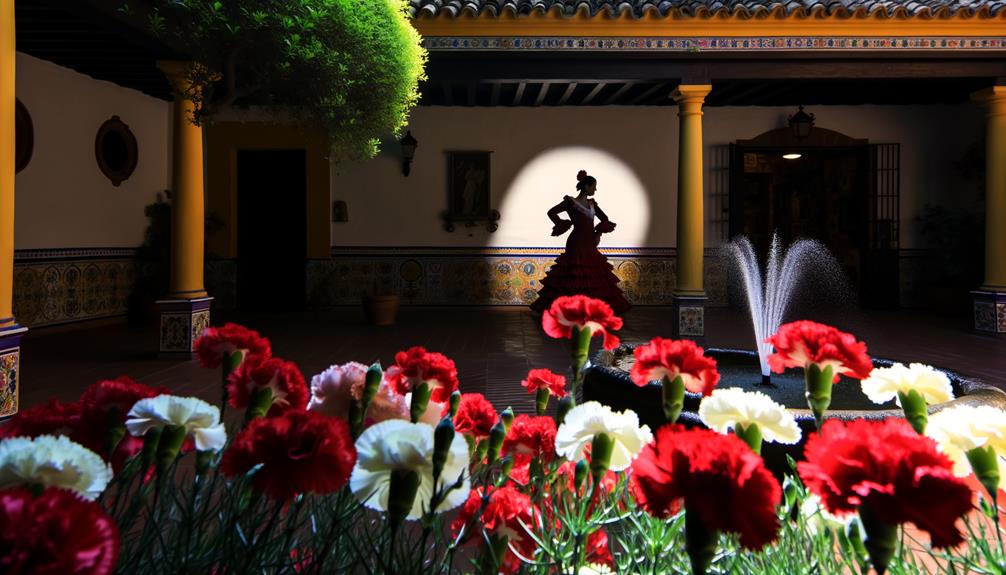Carmen Name Meaning and Origin
The name Carmen originates from the Latin word 'carmen,' meaning 'song' or 'poem.' It traces its roots to 'canere,' which means 'to sing.' In Spanish-speaking countries, Carmen is often associated with 'Our Lady of Mount Carmel,' reflecting deep religious veneration dating back to the 13th century. This historical significance is bolstered by the Feast of Our Lady of Mount Carmel on July 16th.
In literature and culture, Carmen embodies themes of passion, strength, and complexity. Notable figures and fictional characters named Carmen highlight its enduring relevance.
To uncover the full extent of Carmen's rich historical and cultural impact, consider the detailed tapestry it weaves in various domains.

Key Takeaways
- Carmen derives from Latin 'carmen,' meaning 'song' or 'poem.'
- The name originates from the Latin 'canere,' which means 'to sing.'
- In Spanish-speaking countries, Carmen refers to 'Our Lady of Mount Carmel.'
- Carmen is associated with themes of passion, strength, and maternal virtues.
- The name's popularity is influenced by historical, cultural, and artistic factors.
Etymology of Carmen
The name Carmen, frequently associated with rich cultural and historical significance, derives from the Latin word 'carmen,' meaning 'song' or 'poem.' This etymological root indicates a connection to the arts and literature, reflecting the name's lyrical and expressive connotations.
The Latin 'carmen' itself originates from the earlier term 'canere,' which means 'to sing.' Over time, the name Carmen was adopted into various languages, maintaining its poetic essence.
Importantly, Carmen also appears in Spanish-speaking countries, where it can function as both a given name and a reference to the Virgin Mary, specifically 'Nuestra Señora del Carmen' (Our Lady of Mount Carmel). This duality enriches its linguistic and cultural tapestry, making Carmen a name of profound depth and historical resonance.
Historical Significance
Beyond its etymological roots, Carmen's historical significance is deeply intertwined with its cultural and religious connotations, particularly in Spanish-speaking regions where it symbolizes reverence for the Virgin Mary.
Originating from 'Nuestra Señora del Carmen' (Our Lady of Mount Carmel), the name reflects a profound veneration dating back to the 13th century. The Carmelite Order, founded on Mount Carmel in Israel, played a significant role in spreading this devotion.
Celebrated on July 16th, the Feast of Our Lady of Mount Carmel underscores the name's enduring religious significance. This veneration is not merely historical but persists in modern times, reflecting Carmen's deep-rooted association with protection, guidance, and the maternal virtues of the Virgin Mary.
Cultural Associations
Carmen's cultural resonance extends across various domains, including literature, music, and cinema, where it often embodies themes of passion, strength, and complexity.
Historically, the name Carmen is deeply entwined with Spanish culture, often evoking vivid imagery of fiery temperament and emotional intensity.
In music, the opera 'Carmen' by Georges Bizet stands as a seminal work that has immortalized the name, portraying the titular character as a symbol of unbridled passion and defiance.
In cinema, numerous adaptations have reinforced these attributes, embedding Carmen in the cultural psyche as an archetype of compelling, multifaceted femininity.
Additionally, the name's religious connotations, stemming from 'Our Lady of Mount Carmel,' add layers of spiritual and historical depth, enriching its cultural significance.
Carmen in Literature
In literature, numerous works have featured characters named Carmen, each contributing to the rich tapestry of themes associated with the name.
The most iconic representation is Prosper Mérimée's novella 'Carmen' (1845), which introduces a fiercely independent and enigmatic gypsy woman. This character, later immortalized in Georges Bizet's opera, symbolizes freedom and defiance against societal norms.
The name Carmen has since been invoked in various literary contexts, often embodying complex, strong-willed women. For instance, in Hemingway's 'For Whom the Bell Tolls,' the character of Pilar reflects similar attributes.
The literary Carmen is frequently portrayed as a figure of passion and rebellion, her name evoking a sense of intrigue and allure that transcends cultural boundaries.
Modern Popularity
The modern popularity of the name Carmen is a proof of its enduring appeal, influenced by historical, cultural, and artistic factors that have shaped its contemporary resonance. Significantly, the name Carmen has maintained a strong presence in various countries, reflecting its global cultural impact.
| Year | Popularity Rank (USA) | Prominent Pop Culture References |
|---|---|---|
| 1990 | 400 | Carmen Sandiego (TV series) |
| 2000 | 320 | Carmen (Opera) |
| 2010 | 300 | Carmen Electra (Celebrity) |
| 2020 | 290 | 'Carmen' by Stromae (Song) |
| 2022 | 280 | Carmen (Netflix Adaptation) |
These elements underscore how Carmen's historical roots and artistic associations continue to resonate, ensuring its relevance in modern times.
Conclusion
The name Carmen has a multifaceted etymology and deep historical roots. Its origins in Latin and Hebrew, along with its pervasive influence in literature and modern popularity, create a rich tapestry of historical and cultural narratives. The Latin name Carmen, derived from the word “carmen” meaning “song” or “poem,” has been associated with the Virgin Mary and the concept of divine poetry. In Hebrew, the name has been linked to the phrase “karmel” meaning “garden” or “orchard. ” This multifaceted etymology adds layers of depth and significance to the Carla name meaning, making it a name with a rich and diverse heritage.
This seemingly unassuming name paradoxically embodies an intricate web of meanings and significances, making it a subject of enduring academic interest.






